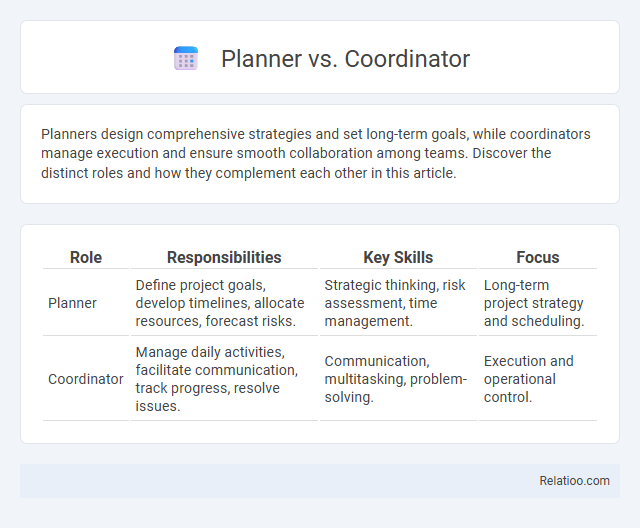Planners design comprehensive strategies and set long-term goals, while coordinators manage execution and ensure smooth collaboration among teams. Discover the distinct roles and how they complement each other in this article.
Table of Comparison
| Role | Responsibilities | Key Skills | Focus |
|---|---|---|---|
| Planner | Define project goals, develop timelines, allocate resources, forecast risks. | Strategic thinking, risk assessment, time management. | Long-term project strategy and scheduling. |
| Coordinator | Manage daily activities, facilitate communication, track progress, resolve issues. | Communication, multitasking, problem-solving. | Execution and operational control. |
Understanding the Roles: Planner vs Coordinator
Planners focus on strategic development, long-term goal setting, and resource allocation to create effective project frameworks. Coordinators prioritize organizing, communication, and ensuring that tasks align with the plan, managing day-to-day operations and stakeholder interactions. Understanding the distinction clarifies how planners design the roadmap while coordinators drive execution and maintain workflow continuity.
Key Responsibilities of a Planner
A Planner is primarily responsible for developing detailed project schedules, allocating resources effectively, and forecasting timelines to ensure on-time delivery. They analyze project requirements, identify potential risks, and adjust plans dynamically to maintain efficiency across all phases. Unlike Coordinators or Project Managers, Planners focus deeply on timeline optimization, resource leveling, and progress tracking to support strategic decision-making.
Key Responsibilities of a Coordinator
A Coordinator manages project logistics by organizing schedules, overseeing communication between teams, and ensuring deadlines are met efficiently. Your key responsibilities include facilitating resource allocation, tracking project progress, and resolving operational issues to maintain workflow continuity. This role acts as the central point for information dissemination, enabling smooth collaboration and timely delivery of objectives.
Skills Required: Planner vs Coordinator
Effective planners must possess strong analytical skills, time management, and strategic thinking to develop comprehensive schedules and allocate resources efficiently. Coordinators require excellent communication, multitasking, and organizational skills to synchronize team efforts and ensure project tasks are completed on time. Your success in selecting between a planner and coordinator role depends on whether you excel more in detailed planning or in managing real-time collaboration and execution.
Decision-Making Power and Authority
Planners typically hold strategic decision-making power, setting long-term goals and frameworks, while coordinators manage operational tasks with limited authority, ensuring execution aligns with plans. Managers possess the highest level of authority, overseeing both planning and coordination, and making critical decisions that impact overall organizational direction. Effective collaboration among planners, coordinators, and managers enhances decision-making efficiency and operational success.
Typical Work Environments
Planners typically work in office settings within urban planning firms, government agencies, or construction companies, focusing on land use and development projects. Coordinators often operate in diverse environments such as corporate offices, event venues, or non-profit organizations, handling logistics, scheduling, and communication among teams. Project Managers balance between field sites and office environments, overseeing project progress, resource allocation, and stakeholder coordination in industries like construction, IT, and marketing.
Interaction with Clients and Teams
Planners strategize project goals and timelines, ensuring alignment with client expectations by conducting regular meetings and feedback sessions to adapt plans dynamically. Coordinators facilitate communication across teams and stakeholders, managing resource allocation and task dependencies to maintain seamless workflow and address client concerns promptly. Planners monitor progress against milestones while integrating client input with team capabilities, fostering collaboration to achieve project objectives efficiently.
Planning Depth and Detail
Planners specialize in in-depth strategic development, creating comprehensive long-term plans with detailed objectives and resource allocations. Coordinators focus on organizing and managing tasks, ensuring seamless communication and timely execution of existing plans without delving deeply into strategic nuances. Your choice between a Planner, Coordinator, or a Planner-Coordinator hybrid depends on whether you require extensive planning depth or efficient operational detail alignment.
Pros and Cons: Planner vs Coordinator
Planners excel in strategic thinking and long-term goal setting, enabling organizations to anticipate challenges and allocate resources effectively, but they may fall short in on-the-ground execution and adapting to real-time changes. Coordinators thrive in managing detailed logistics and team communication, ensuring smooth workflows and timely project completion, yet they can struggle with big-picture planning and future-proofing strategies. Balancing a planner's foresight with a coordinator's operational focus is essential for comprehensive project management and successful outcomes.
Choosing the Right Professional for Your Needs
Choosing the right professional for your needs depends on the scope and complexity of your event or project. A Planner typically offers comprehensive services, managing all aspects from budgeting to execution, while a Coordinator focuses on overseeing specific details and ensuring smooth onsite operations. Understanding your priorities helps determine whether you need a full-scale Planner, a detail-oriented Coordinator, or a combination of both to achieve a successful outcome.

Infographic: Planner vs Coordinator
 relatioo.com
relatioo.com